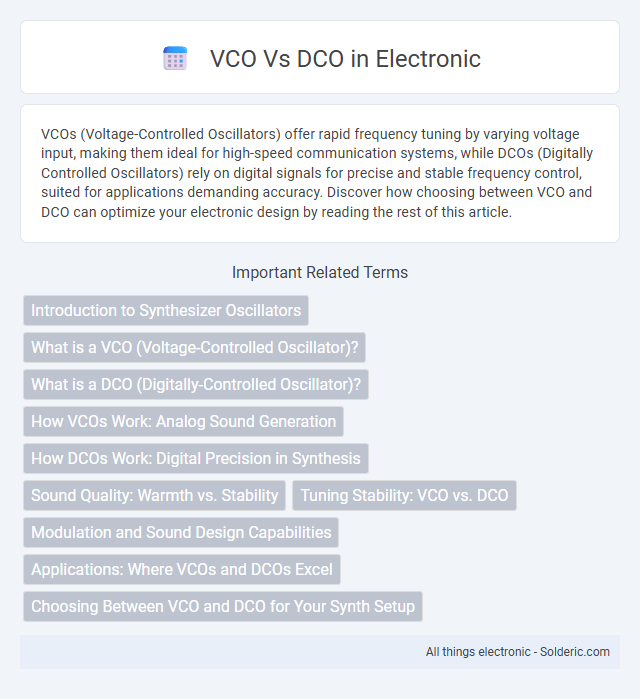VCOs (Voltage-Controlled Oscillators) offer rapid frequency tuning by varying voltage input, making them ideal for high-speed communication systems, while DCOs (Digitally Controlled Oscillators) rely on digital signals for precise and stable frequency control, suited for applications demanding accuracy. Discover how choosing between VCO and DCO can optimize your electronic design by reading the rest of this article.
Comparison Table
| Feature | VCO (Voltage-Controlled Oscillator) | DCO (Digitally Controlled Oscillator) |
|---|---|---|
| Control Method | Analog voltage input | Digital signal input |
| Frequency Stability | Lower stability, affected by temperature and voltage fluctuations | High stability, precise frequency control |
| Signal Quality | Analog waveform, may have more noise and drift | Cleaner waveform, less noise and jitter |
| Typical Applications | Analog synthesizers, FM modulators, radio transmitters | Digital synthesizers, modern audio equipment, frequency synthesis |
| Complexity | Simple, low cost | More complex, higher cost |
| Tuning Accuracy | Less accurate, drift over time | Highly accurate, stable tuning |
Introduction to Synthesizer Oscillators
VCO (Voltage-Controlled Oscillator) and DCO (Digitally Controlled Oscillator) are fundamental components in synthesizer design, shaping sound generation through different technologies. VCOs generate waveforms directly from analog circuits, offering warm, rich tones with natural pitch instability prized in classic synthesizers. DCOs utilize digital clock signals for frequency control, providing improved tuning stability and precision while maintaining analog waveform characteristics, making them favored in modern synths seeking reliable sound consistency.
What is a VCO (Voltage-Controlled Oscillator)?
A Voltage-Controlled Oscillator (VCO) is an electronic oscillator whose output frequency is directly proportional to the input control voltage, making it essential in signal generation and frequency modulation applications. VCOs are widely used in communication systems, synthesizers, and phase-locked loops (PLLs) due to their ability to produce variable frequencies with high precision and stability. Your designs benefit from the VCO's rapid tuning capability, enabling dynamic frequency control critical in modern RF and audio signal processing.
What is a DCO (Digitally-Controlled Oscillator)?
A Digitally-Controlled Oscillator (DCO) uses digital signals to control its frequency, providing precise and stable oscillation compared to traditional voltage-controlled oscillators (VCOs). Your audio gear benefits from a DCO's ability to minimize tuning drift and maintain consistent pitch in synthesizers and signal generators. This makes DCOs ideal for modern music production where reliability and accuracy are crucial.
How VCOs Work: Analog Sound Generation
VCOs generate sound through analog voltage control, producing waveforms such as sine, square, triangle, and sawtooth that form the foundation of classic synthesizer tones. The frequency of oscillation in a VCO changes in response to the input control voltage, allowing precise pitch modulation essential for creating rich, dynamic analog sounds. Your understanding of VCOs enhances music production by leveraging their warm, natural sound characteristics that DCOs often aim to emulate with digital stability.
How DCOs Work: Digital Precision in Synthesis
DCOs use digital circuits to generate a stable and accurate waveform frequency, reducing tuning drift common in analog VCOs. By employing a digital clock and counter, DCOs maintain precise pitch control, ensuring consistent sound quality during performance. Your synthesizer benefits from digital precision, delivering reliable oscillation with less temperature sensitivity and greater long-term stability.
Sound Quality: Warmth vs. Stability
VCOs (Voltage-Controlled Oscillators) deliver rich, warm sound characterized by natural pitch fluctuations and subtle analog imperfections, prized for their organic musical expressiveness. DCOs (Digitally Controlled Oscillators) offer enhanced pitch stability and tuning accuracy by combining digital control with analog circuits, reducing drift and noise for consistent sound quality. Musicians seeking warmth lean toward VCOs, while those prioritizing stability and precision often prefer DCOs in synthesizers.
Tuning Stability: VCO vs. DCO
VCOs (Voltage-Controlled Oscillators) often face tuning instability due to temperature variations and component aging, requiring frequent calibration to maintain frequency accuracy. DCOs (Digitally Controlled Oscillators) use digital control for frequency generation, offering superior tuning stability and consistent performance over time. Your choice of oscillator impacts the reliability of frequency output, with DCOs generally providing better long-term tuning stability compared to VCOs.
Modulation and Sound Design Capabilities
VCOs (Voltage-Controlled Oscillators) generate raw waveforms with stable pitch and rich harmonic content, making them ideal for precise modulation and classic analog sound design. DCOs (Digitally Controlled Oscillators) offer improved tuning stability and enhanced waveform accuracy through digital control, enabling more complex modulation options and consistent sound reproduction. Both oscillators support extensive modulation capabilities such as pulse-width modulation and frequency modulation, but VCOs are favored for warmer, vintage tones while DCOs excel in versatility and modern synthesis applications.
Applications: Where VCOs and DCOs Excel
VCOs (Voltage-Controlled Oscillators) excel in applications requiring rapid frequency tuning, such as phase-locked loops in communication systems and frequency modulation in radio transmitters. DCOs (Digitally Controlled Oscillators) are preferred in digital synthesizers and precision timing circuits due to their stability and programmability, making them ideal for programmable clocks and digital signal processing. Your choice depends on the need for either analog frequency agility with VCOs or digital accuracy and repeatability with DCOs.
Choosing Between VCO and DCO for Your Synth Setup
Choosing between a Voltage-Controlled Oscillator (VCO) and a Digitally-Controlled Oscillator (DCO) depends on the desired sound quality and stability in your synth setup. VCOs offer rich, warm analog tones with subtle pitch variations, favored for classic and vintage synthesis, while DCOs provide precise tuning stability and reduced noise through digital control, ideal for consistent performance in modern productions. Synth enthusiasts often weigh the organic character of VCOs against the reliability of DCOs to match their workflow and sonic preferences.
VCO vs DCO Infographic

 solderic.com
solderic.com